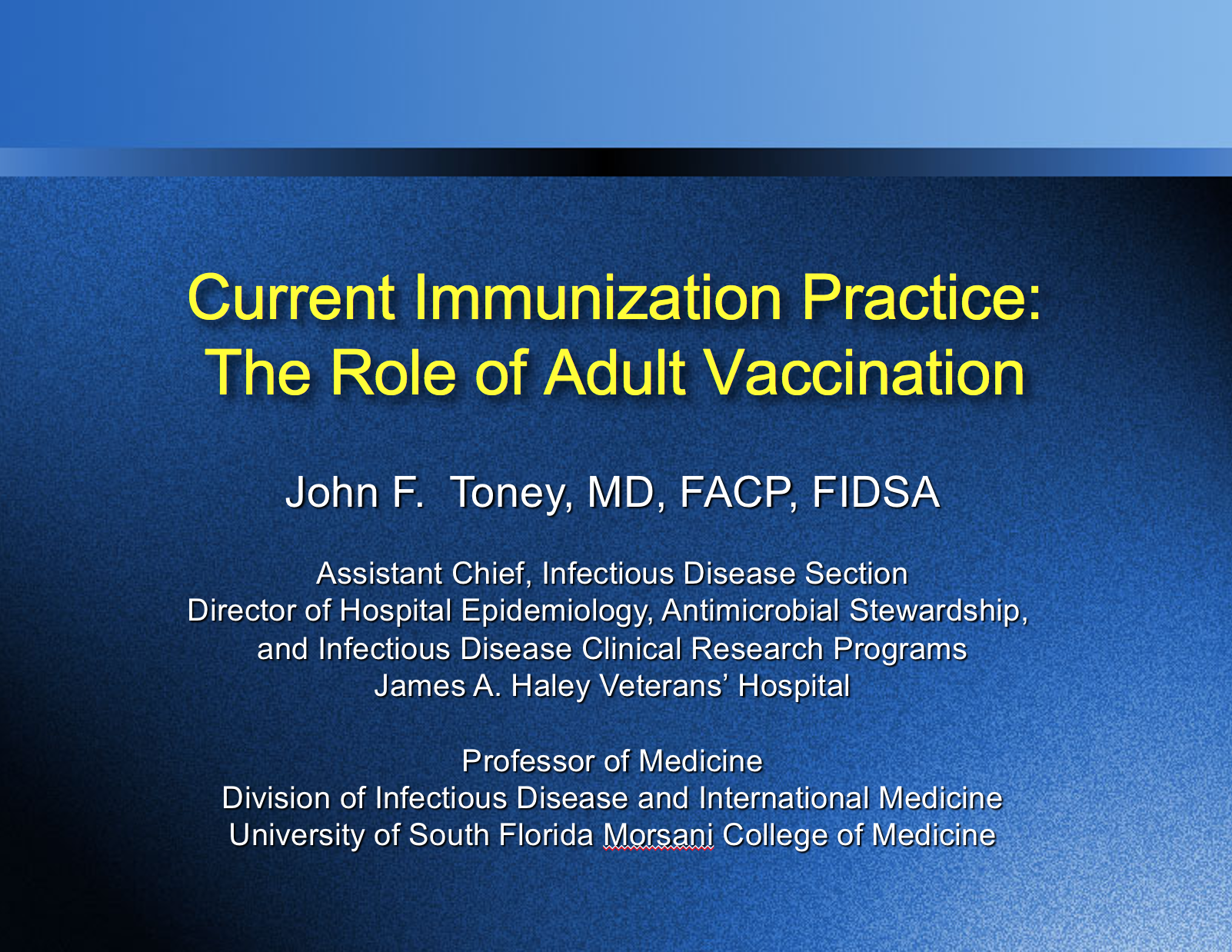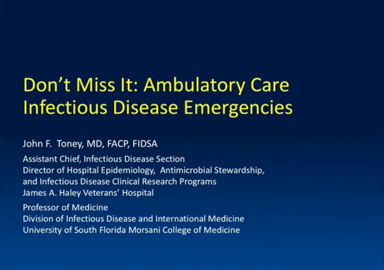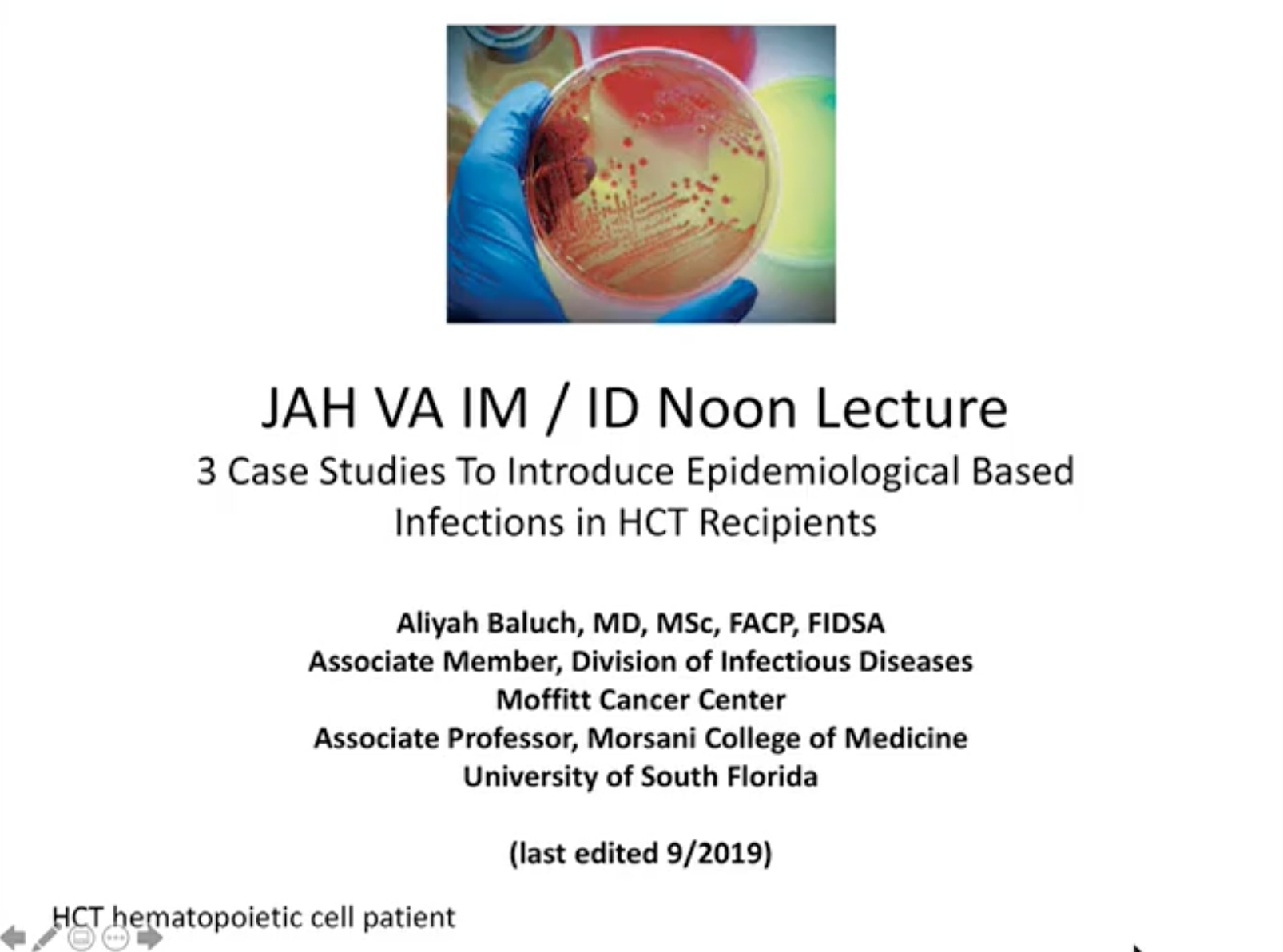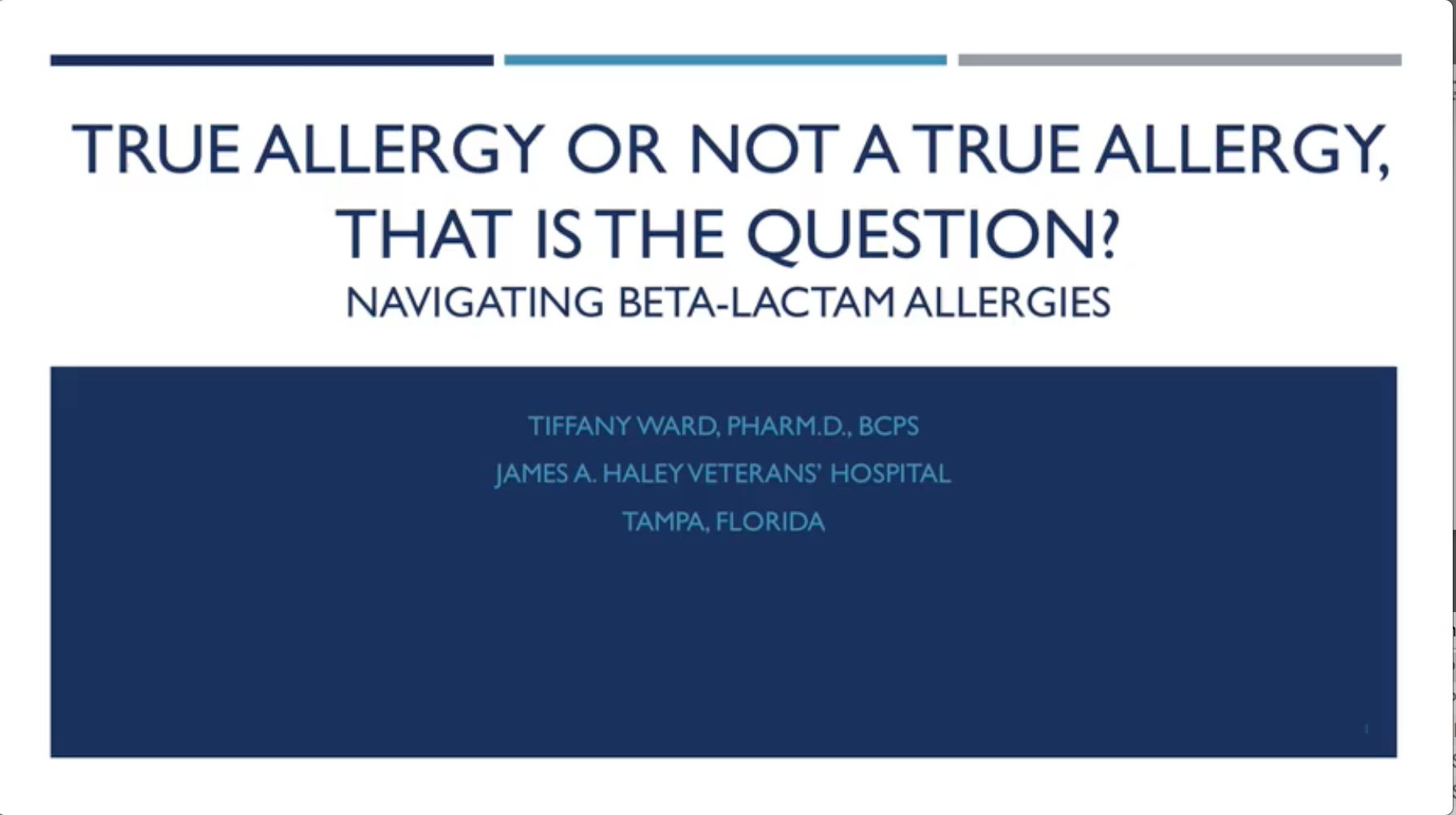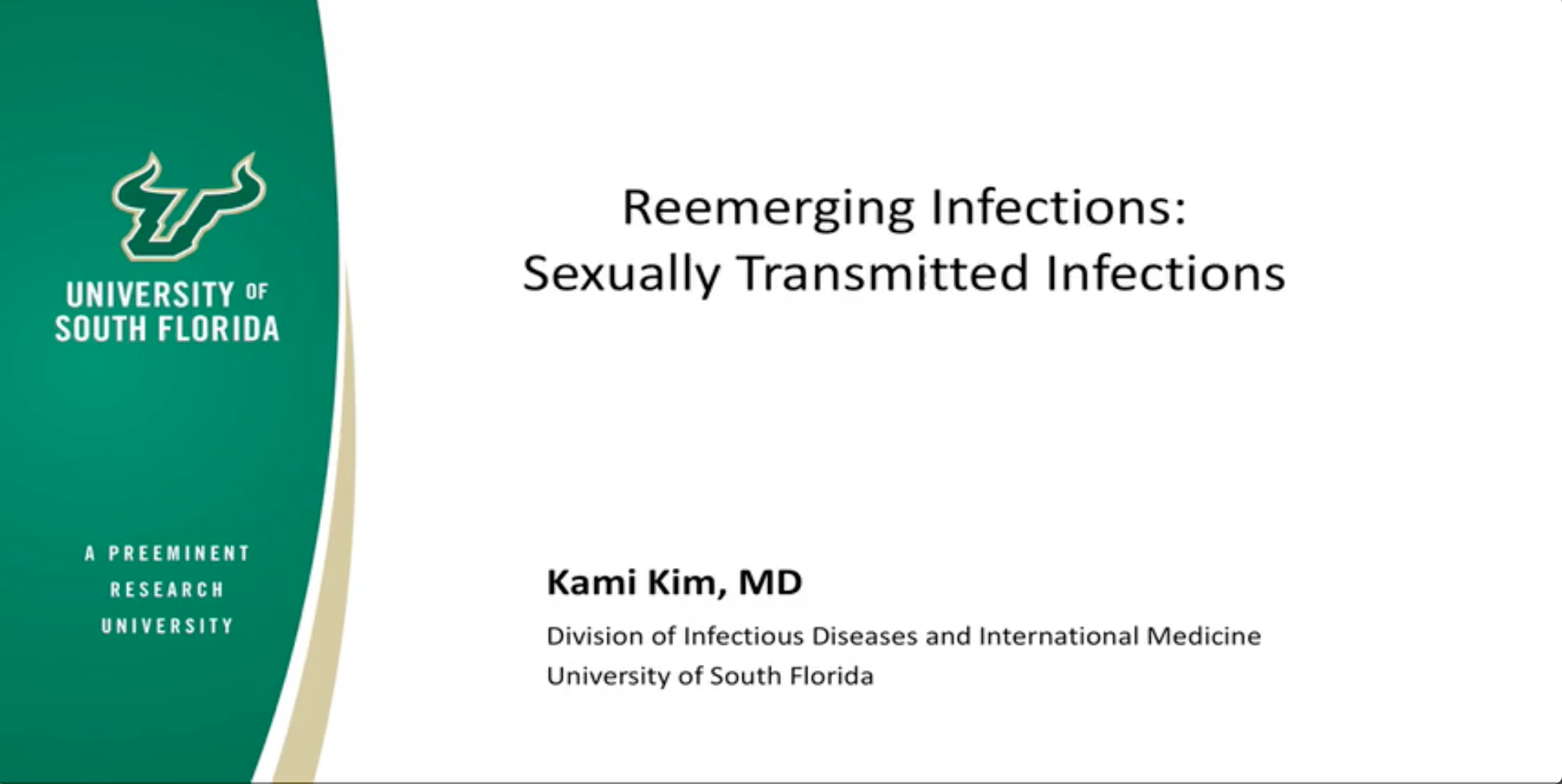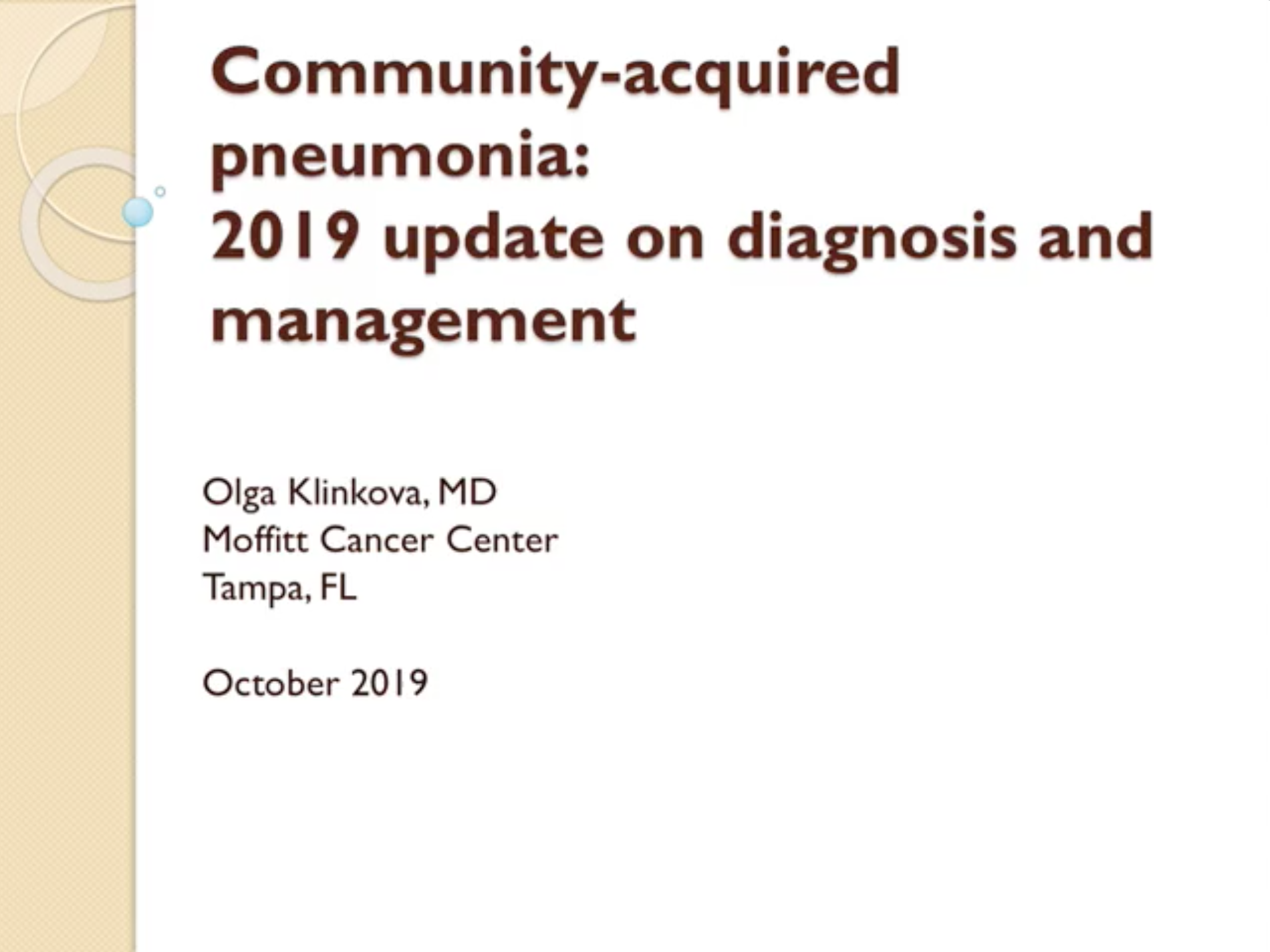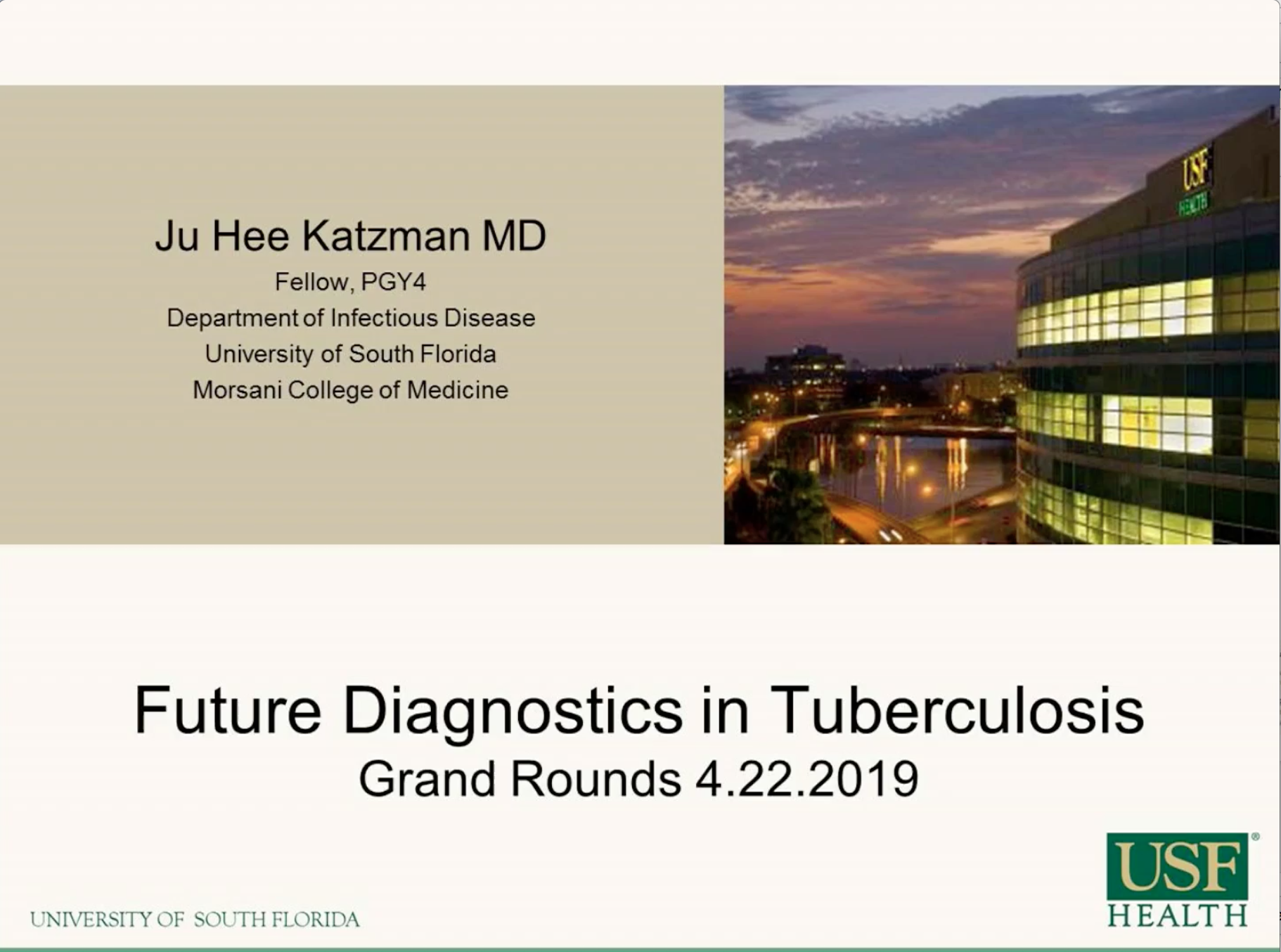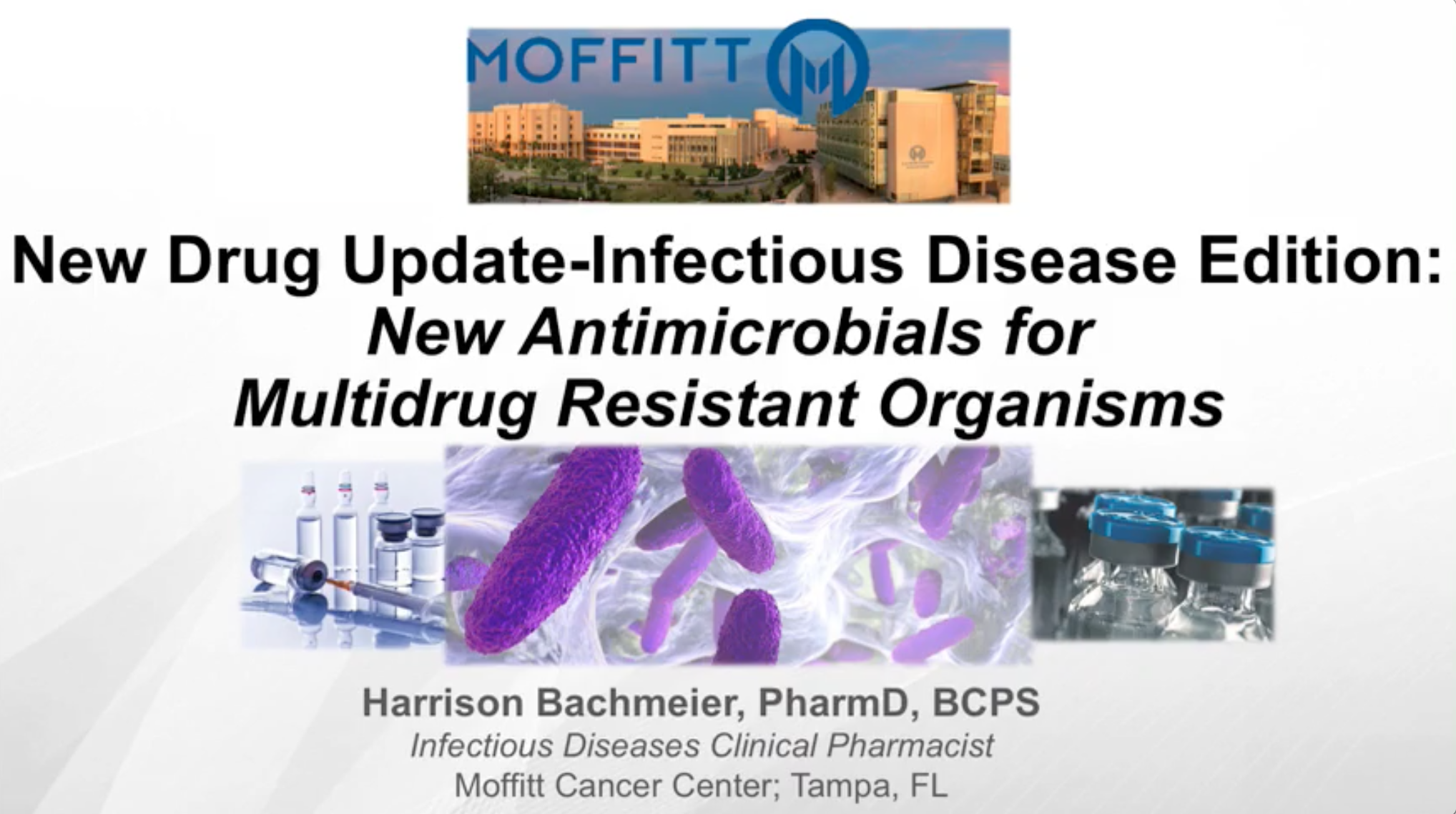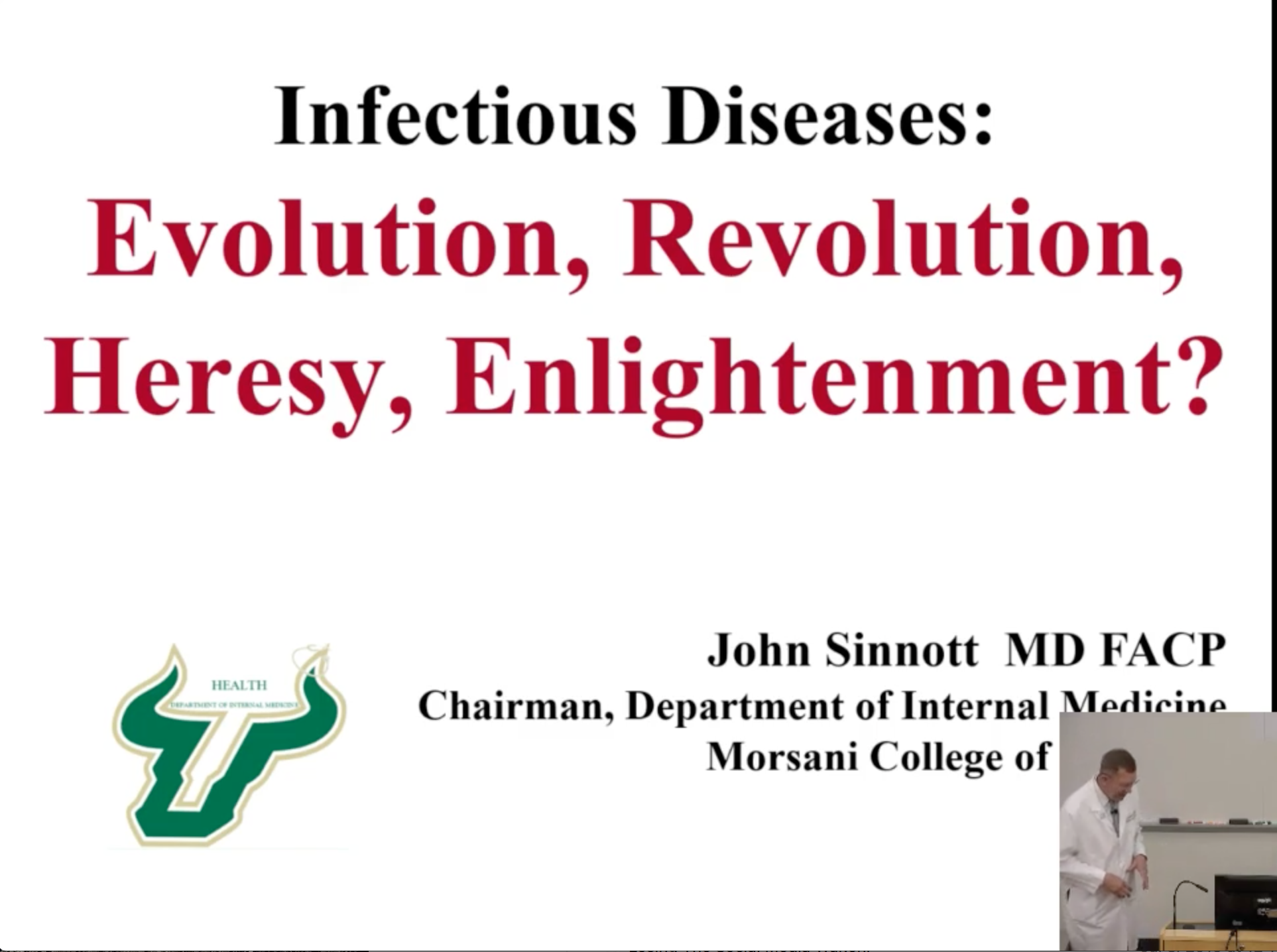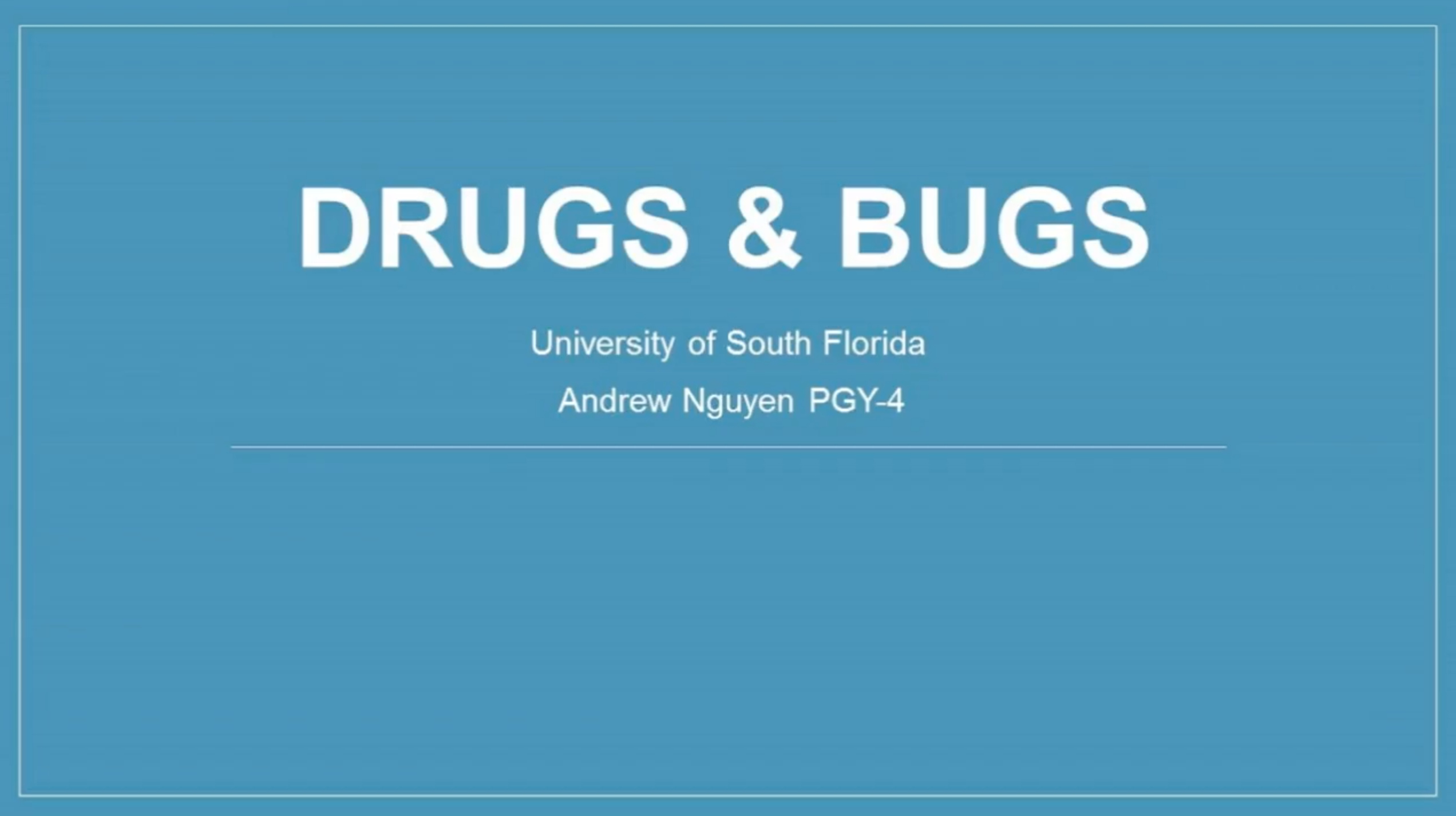Dr. Toney presents an overview of adult vaccinations, focusing on the vaccines that are most important and relevant for the adult patient. He begins by discussing pneumococcal vaccines, whose guidelines can often be confusing because of the two different types of vaccines and their distinct administration schedules. He next talks about the influenza vaccine, differentiating the different types of vaccines, the efficacy of the flu shot, and potential future flu vaccine products. Next, he discusses the TDAP and the importance of receiving this vaccine given waning adult immunity for Pertussis. Dr. Toney also touches upon Shingles immunization and the significant advance of the recombinent shingles vaccine that is now available. Lastly, he discusses the MMR, Meningococcus, and Hepatitis vaccines.
Archives
Don’t Miss It: Ambulatory Care Infectious Diseases Emergencies
Dr. Toney, Professor of Medicine in the Division of Infectious Diseases at the University of South Florida, conducts a case-based discussion regarding Infectious diseases syndromes for which it is essential that a provider not miss the diagnosis in an ambulatory care setting. Dr. Toney initiates each case by presenting a case, then providing choices of possible answers, followed by clinical pearls relevant to the case. At the conclusion of this informative and interactive presentation, it is hoped that the audience will have a greater understanding of several critical ID ambulatory care emergencies that every provider needs to recognize.
Clinical Review of Three BMT Cases
Navigating Beta-Lactam Allergies
Dr. Ward begins her presentation by reviewing the impact of beta-lactam allergies on the healthcare system. She then discusses the classification system for the different types of hypersensitivity reactions. The significance of beta-lactam allergy cross reactivity is then mentioned. She goes on to explain how beta-lactam allergy testing is performed. Lastly, she identifies strategies to improve the documentation of beta-lactam allergy reporting.
Emerging Infections: Sexually Transmitted Infections
Dr. Kami Kim, Chief of Infectious Diseases at the University of South Florida College of Medicine, discusses an important subset of emerging infections: sexually transmitted diseases (STIs). She initially reviews the current epidemiology of STIs in the U.S. She differentiates the more common and less common STIs. She goes on to discuss risk factors for sexually transmitted infections. She focuses on Neisseria gonorrhea infections, and discusses epidemiology, drug resistance, and treatment changes. She closes by sharing information on the diverse syndromes associated with Chlamydia trachomatis, including genital ulcer disease, urethritis, and cervicitis, extragenital infections, and pelvic inflammatory disease, and shares general treatment strategies and pitfalls.
Community Acquired Pneumonia: Update on Diagnosis and Management
Dr. Olga Klinkova, Infectious Diseases Clinician at the Moffitt Cancer Center and Research Institute, discusses the recent updates to the diagnosis and management of community acquired pneumonia. Dr. Klinkova begins her talk by referring to the recently introduced IDSA-ATS guidelines, released in August, 2019. She then discusses updates in the microbiology of CAP, including the most likely organisms, the role of MRSA, atypicals and the significance of viral pathogens. She then mentions diagnostic modalities and the relevance of clinical prediction algorithms such as CURB-65 and the Pneumonia Severity Index (PSI). Treament considerations including outpatient versus inpatient, and inpatient non-severe versus inpatient severe management are also differentiated. Specific treatment agents and therapy durations are also mentioned. Lastly, she discusses options for the management of MRSA pneumonia and aspiration syndromes.
Future Diagnostics in Tuberculosis
Dr. Ju Hee Katzman begins her lecture by discussing some basic epidemiology of Tuberculosis, a major killer worldwide and still a significant infectious cause of mobility in the U.S. Dr. Katzman reviews the traditional diagnostic modalities for diagnosing TB (including expectorated sputum samples for smear and culture). She then goes on to discuss specific molecular techniques for diagnosing TB that will play an increasingly larger role in the future. Lastly, she touches upon the ways in which AI (Artificial Intelligence) can be utilized to detect and treat active tuberculosis in settings where health provider availability is greatly challenged.
New Antimicrobials for Multidrug Resistant Organisms
Dr. Bachmeier presents an up-to-date review of newer-generation antimicrobials designed to be effective against infections with multiple drug-resistant pathogens. He first reviews the different types of extended-spectrum beta-lactamase (ESBL) resistance. He then discusses the significance of Carbapenemase-producing enterobacteriaceae and ESBL producing E coli, Klebsiella pneumonia, and Pseudomonas aeruginosa strains. Such organisms have become increased threats to our patients over the last two decades while new drug approvals have dwindled. Dr. Bachmeier reviews Ceftolozane-tazobactam, Ceftazidime-avibactam and their current indications. He then reviews Meropenem-vaborbactam and its utility in the treatment of Klebsiella pneumonia carbabenemase (KPC) infections. He then discusses imipenem-relebactam and its advantages in the treatment of MDR gram-negative infections. Lastly, he reviews plazomycin, eravacycline, and Cefiderocol.
Infectious Diseases: Evolution, Revolution, Heresy, Enlightenment?
Dr. Sinnott’s grand rounds presentation reflects upon the history of infectious diseases, from the late 1960’s, when the battle with infectious agents was felt to have been won, to the present age of widespread antimicrobial resistance, emerging pathogens, and the newer therapies of the “post-antibiotic era.” He focuses on genetic susceptibility, and how this has played a major role in infectious diseases outbreaks of the past. He also touches upon commercial “boutique” genetics services which offer to sequence an individual’s genome for ancestry and hereditary purposes. Lastly, he comments on the importance of the human microbiome to disease susceptibility and wellness.
Drugs & Bugs: Complications of Addictive Disorders
Dr. Nguyen examines the complex problem of the addiction crisis, a major cause of morbidity and death in much of the US, and especially in the state of Florida. He first discusses the epidemiology of addictive disorders and the US states where these patients are more likely to be found. He then discusses specific addiction-related medical syndromes, including acute eosinophilic pneumonia, crack cocaine lung, complications of body packing, fungal sinusitis, endocarditis, skin and soft tissue infections, fungal pneumonia, and other septic complications of injection drug use
